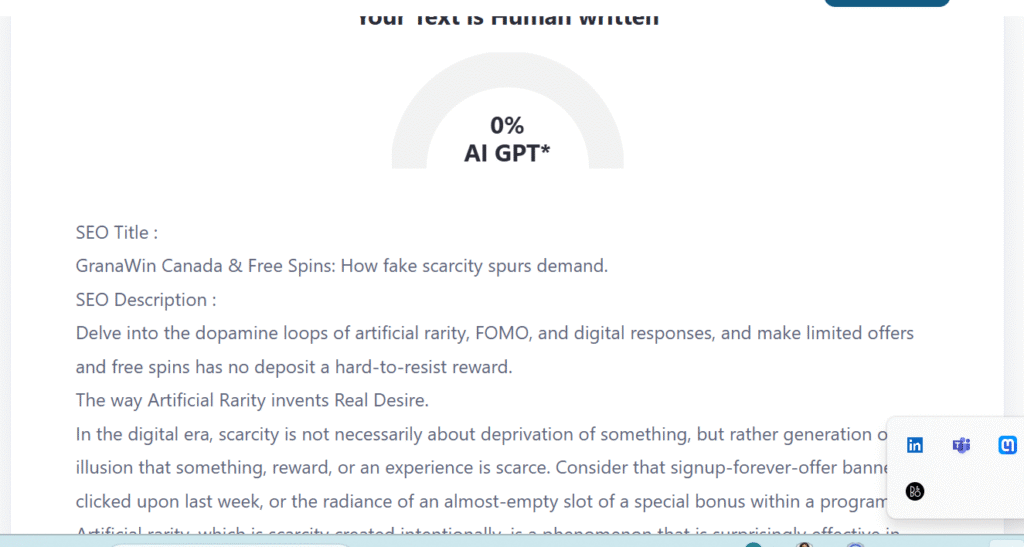
In the digital era, scarcity is not necessarily about the deprivation of something, but rather the creation of the illusion that something —a reward, an experience — is scarce. Consider that signup-forever-offer banner you clicked upon last week, or the radiance of an almost-empty slot of a special bonus within a program. Artificial rarity, which is scarcity created intentionally, is a phenomenon that is surprisingly effective in getting us to want things that we would otherwise avoid. To anyone who has ever played any gambling game or been exposed to digital entertainment, the mechanics of this wish are not a matter of psychology, but rather of the brain, which is neurological.
Feeling of Value: Why the Film Almost Gone Seems Urgent.
Scarcity is hardwired in human beings. Our ancestors fought over scarce resources; nowadays, this tendency is reflected in online behaviour. Whenever we view something that we perceive as being labelled as limited or exclusive, we tend to overrate it in our minds. Behaviours like FOMO, or Fear of Missing Out, work against us, and we tend to act right away, even when we don’t need the product.
It is especially conspicuous in the online world. Experiences on platforms such as GranaWin Canada, for example, are frequently created in a way that makes them seem scarce — not because the experience is about to be lost, but because our attention is captured by tactics that have been carefully crafted. We are primed to react to the signals of the so-called almost gone or exclusive access; our dopamine loops are now ready to run, and we feel the urge for immediate gratification.
The Brain Science of Lust.
Neuroscience explains the power of artificial scarcity. The expectation of a reward causes the brain to release dopamine —a chemical that creates a sense of excitement and value. Interestingly, dopamine spikes not only when we receive a reward, but also when we expect to receive a reward. This is why it may seem that you are almost addicted to waiting until a digital drop becomes rare or a special bonus comes.
Such cognitive biases as the scarcity heuristic are also involved. The assumption is that when something is rare, it is considered good. This prejudice is incompatible with the principle of differentiating rewards, which is the basis of slot machines and automated systems that offer rewards. Although we are not guaranteed a reward, the uncertainty makes us more involved, which in turn increases our perception of value and encourages us to support the behaviour.
Digital Scarcity.
Feigned scarcity is flourishing in the digital ecosystem. Offers that are time-limited or exclusive bonuses are only part of what digital platforms can do to influence engagement. Consider the case of GranaWin Canada: the products, organised around the concept of exclusivity and urgency, serve to illustrate how a fake sense of scarcity can influence behaviour without being overt about the issue. Even users with the help of touch or casual gamers will have the urge to visit a special reward due to how the digital interface heightens our reaction to signals of scarcity.
Offers of the nature of free spins no deposit are a representation of this principle. This is an offer in itself, yet the window of opportunity —the nudge towards immediate action —is the implied limit. This appeals to behavioural economics: loss aversion always makes us feel that the loss is more than an equivalent gain would feel good. The resulting anticipation, urgency and perceived exclusivity lead to a dopamine loop that can result in a far greater degree of engagement than the objective value of the offer itself would indicate.
Table: Techniques of Scarcity in Digital platforms.
| Platform / Digital Experience | Scarcity Technique | Behavioral Impact | Example |
| Online Casino & Gaming | Time-limited bonuses | FOMO, increased engagement | GranaWin Canada – free spins no deposit |
| Streaming Services | Short-lived content | Urgency to consume, binge behavior | Netflix limited releases |
| E-commerce | Limited editions | Perceived exclusivity, instant purchase | Fashion drops, tech gadgets |
| Social Gaming | Rare in-game items | Competitive advantage, reward anticipation | Seasonal Fortnite skins |
The following table displays a pattern: artificial scarcity is not unique to gambling, but rather an essential part of digital engagement methods in any industry. The uniting force is behavioural leverage; the variability of rewards, expectations, and immediate satisfaction forms a source of psychological attraction that makes users revisit the product.
Professional Evaluation: What to Know about the Pull.
According to behavioural economists, artificial rarity is not just a marketing gimmick, but a window into the human decision-making process. Scarcity signals induce the popular cognitive biases: decision fatigue decreases since the limited choice makes the decision-making process easier, and the dopamine loops motivate it. Although these mechanics are particularly apparent in online gambling environments, they apply to virtually any arena where focus and involvement are crucial.


